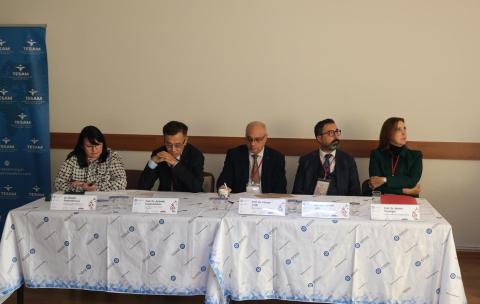Organized in collaboration with Marmara University Institute of Turkic Studies, Kazakhstan’s Jochi Ulus Research Institute, the Shihabeddin Marjani Institute of History under the Tatarstan Academy of Sciences, the Center for Golden Horde Studies, and the Center for Economic, Political and Strategic Research (TESAM), the International Symposium on “Science in the Golden Horde” was held at Marmara University’s Göztepe Campus on November 4–5. The symposium, attended by both domestic and international scholars, addressed the scientific and intellectual heritage of the Golden Horde, its intellectual world, its interaction with Islamic civilization, and its influence on regional scientific circles from multiple perspectives.
The opening speeches were delivered by Prof. Dr. İlyas Kemaloğlu from Marmara University’s Department of History and Dr. İlyas Bozkurt, President of TESAM. The first session, chaired by Prof. Dr. İlyas Kemaloğlu, featured presentations by Prof. Dr. İhsan Fazlıoğlu, Prof. Dr. Iskander Izmiyalov, and Dr. Ilnur Mirgaleev. This session focused on the emergence of scientific thought in the Golden Horde region, the structure of knowledge production processes, and the development of written culture. The presentations discussed the circulation of knowledge within the intellectual circles of the period, the fields of activity of scholars, and the historical and cultural factors that shaped the scientific tradition.
The second session, chaired by Prof. Dr. Hayrunnisa Alan, included contributions from Prof. Dr. İlyas Kemaloğlu, Prof. Dr. Dinçer Koç, Prof. Dr. Ashirbek Muminov, and Dr. Jaxylyk Sabitov. This session addressed the influence of Islam on the development of science in the Jochi Ulus, the role of religious orders in the region, and the contributions of the Khwarazmian school to Islamic law during the Golden Horde period. The participants discussed the intellectual environment shaped by the spread of Islam in the region, the institutionalization of religious thought, and the impact of legal approaches on the scientific tradition.
The afternoon session, chaired by Prof. Dr. Yüksel Çelik, continued with presentations by Prof. Dr. Aybolat Kuşkumbaev, Prof. Dr. Melek Özeytgin, Assoc. Prof. Dr. Serkan Acar, and Dr. Elmira Sayfetdinova. This session addressed the intellectual legacy of scholars who emerged during the Golden Horde era, the historical reflections of the Turkic epic tradition, sources shedding light on the history of the Kazan Khanate, and studies related to the medical knowledge of the period.
The final session of the day, chaired by Prof. Dr. Ahmet Taşağıl, featured contributions from Dr. Radik Temirgaliyev, Dr. Liliya Baybulatova, Dr. Nursultan Umbetov, Dinara Suleimenova, and Dr. Lütsiya Giniyatullina. The papers in this session focused on various aspects of the Golden Horde’s cultural and intellectual heritage. Topics included the role of the cırau tradition in the transmission of historical narratives, historical research conducted in the successor khanates of the Golden Horde, comparative evaluations of the understanding of science in the historiography of Kazakhstan and Russia, and the treatment of Golden Horde science in contemporary academic studies.
The symposium concluded with a final evaluation session featuring Prof. Dr. Ahmet Taşağıl, Prof. Dr. İlyas Kemaloğlu, Dr. Ilnur Mirgaleev, and Dr. Jaxylyk Sabitov. The participants emphasized the significance of scholarly research on the Golden Horde for both Turkish and global historiography and reflected on the symposium’s contributions to the academic field.

